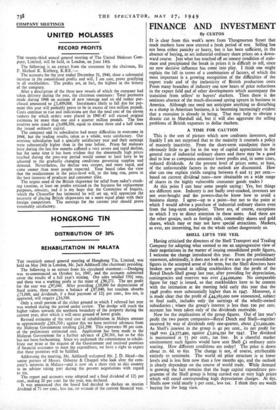FINANCE AND INVESTMENT
By CUSTOS
IT is clear from this week's news from Throgmorton Street that stock markets have now entered a fresh period of test. Selling has not been either panicky or heavy, but it has been sufficient, in the absence of buying, to set industrial ordinary share prices on a down- ward course. Just what has touched off an uneasy condition of stale- mate and precipitated the break in prices it is difficult to tell, since no new decisive influence has come into play. I think one might explain the fall in terms of a combination of factors, of which the most important is a growing recognition of the difficulties of the export trade and of the inelasticity of British production costs. From many branches of industry one now hears of price reductions in the export field and of other developments which accompany the transition from sellers' to buyers' markets. Then there is the ominous absence of the much-discussed spring upturn in business in America. Although one need not anticipate anything so disturbing as a slump in American business, it is becoming increasingly evident that a recession is already in being. That may help to obviate a drastic cut in Marshall aid, but it will also aggravate the selling problems of British exporters to dollar mar' kets.
A TIME FOR CAUTION
This is the sort of picture which now confronts investors, and frankly I am not surprised that to the majority it counsels a policy of masterly inactivity. From the short-term standpoint there is obviously little to go for in the way of capital appreciation in the general run of industrial ordinary shares and there may be a good deal to lose as companies announce lower profits and, in some cases, reduced dividends. At the present level of prices some, at least, of the unfavourable factors in the outlook are discounted. How else can one explain yields ranging between 6 and 15 per cent.— based on current dividend rates—now obtainable on a wide range of shares in the highly vulnerable consumer goods trades ?
At this point I can hear some people saying: Yes, but things are different now. Industry is not badly over-stocked, investors are not over-bought and the powers-that-be know how to avoid a business slump. I agree—up to a point—but not to the point at which I would advise a purchase of industrial ordinary shares even from the long-term standpoint. There are, of course, exceptions to which I try to direct attention in these notes. And there are the other groups, such as foreign rails, commodity shares and gold shares, which may or may not have special attractions. Markets, as ever, are interesting, but on the whole rather dangerously so.
SHELL LIFTS THE VEIL
Having criticised the directors of the Shell Transport and Trading Company for adopting what seemed to me an unprogressive view of their negotiations in the matter of issuing consolidated profit figures, I welcome the change introduced this year. From the preliminary statement, admittedly, it does not look as if we are to get consolidated figures in the accepted sense of the term, but the Shell directors have broken new ground in telling stockholders that the profit of the Royal Dutch-Shell group last year, after providing for depreciation, contingencies and reserves was over f,44,000,000. No comparable figure for 1947 is issued, so that stockholders have to be content with the intimation at the meeting held early this year that the 1948 profits were substantially higher than in 1947. Moreover, it is made clear that the profit of L44,565,000 now announced, subject to final audit, includes only the earnings of the wholly-owned subsidiaries ; where the group's interest is less than ioo per cent. account has been taken only of the dividends receivable.
Now for the implications of the group figures. Out of last year's profit the two parent companies—Royal Dutch and Shell—together received by way of dividends only one-quarter, about LI i,000,000. As Shell's interest in the group is 4o per cent., its net profit for 1948 was £4,377,490, against £3,924,292 for 1947. The dividend is maintained at 7+ per cent., tax free. In a cheerful market environment such figures would have sent Shell ordinary units soaring. How different conditions are today! The price is down about 2s. 6d. to 65s. The change is not, of course, attributable entirely to sentiment. The world oil price structure is at lower levels and is less firm now than a few months ago, and the outlook is clearly dependent on the course of world trade. While demand is growing the fact remains that the huge capital expenditure pro- gramme of the Shell group is being carried out at very high prices which will entail corresponding high depreciation charges. At 65s. Shells now yield nearly 5 per cent., less tax. I think they are worth buying for the long view.






































 Previous page
Previous page